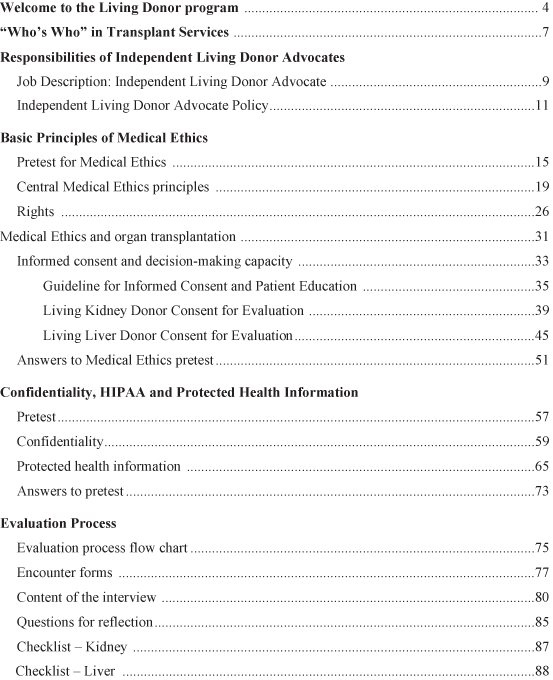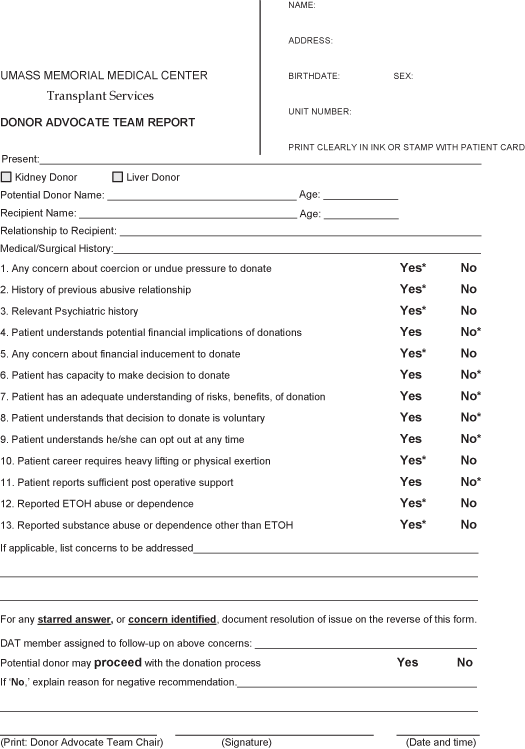Living Kidney Donor Evaluation Independent Donor Advocate Sign-Off1
Appendix 12.4

Contents of ILDA Training Manual
Appendix 12.5
Medical Ethics Pretest
This pretest will not be “graded”: it is provided as a tool for you to assess your comprehension and retention of the material in this training booklet. You will have an opportunity to complete a “post-test” after you have completed this section.
1.
Give an example that illustrates the difference between an intrinsic value and an instrumental value. Why is this distinction important in assessing potential living donors?
2.
In response to the shortage of dialysis machines in the 1960s, Congress decided to underwrite the costs of care for all patients with end-stage kidney disease. This decision is an example of:
A.
Micro-allocation
B.
Macro-allocation
C.
Formal principle of justice
D.
Material principle of justice
3.
The requirement of obtaining informed consent for evaluation as a Living Donor is based primarily on which principle?
A.
Beneficence
B.
Justice
C.
Nonmaleficence
D.
Autonomy
E.
Preservation of Life
4.
The potential donor’s right to information about the risks and benefits of Living Donation creates a ___________ duty for the provider. In other words, the provider is required to _____________________________________________________________________
A.
Positive
B.
Absolute
C.
Negative
D.
Conditional
5.
That physicians can overrule the patient’s desire to donate a kidney because of a higher risk of developing diabetes at some point in the future is an example of:
A.
Nonmaleficence
B.
Paternalism
C.
Negative duty
D.
Beneficence
6.
The current model of organ donation in the US is an example of:
A.
An “opt-in” system
B.
An “opt-out” system
C.
A system that privileges justice over autonomy (i.e., places a higher value on justice)
D.
A system that values the public’s best interest over the individual’s best interests.
7.
In Massachusetts, the standard of disclosure used to measure the validity of informed consent is:
A.
The Professional Community standard
B.
The Subjective Person standard
C.
The Autonomy standard
D.
The Reasonable Person standard
8.
True False Only the courts can determine whether a person is competent or incompetent.
9.
As an ILDA, you will be assessing the potential donor’s decision-making capacity. What will you be looking for?
10.
Describe what kind of duty is associated with the right to life (i.e., is it positive or negative, in rem or in personam). How does that characterization affect organ transplantation?
Note
The next set of questions are based on cases, or composites of cases we have evaluated in our program. They are designed to give you practice with “real” situations, and to compare your answers with the original evaluation in the case.
11.
Your patient tells you that he is receiving financial support from his father, the potential recipient, during the period that he will be out of work for the donation procedure and recovery. As the patient’s ILDA, are you concerned about this exchange of money? If so, what will you do to address your concern? If not, explain why you are not worried about the exchange of money between recipient and donor.
12.
Your patient is a young woman who plans to donate part of her liver to her mother, who has previously had two liver transplants secondary to alcoholism. During your interview, you hear about your patient’s childhood, during which, at a very young age, she had assumed the role of parent to her younger siblings. She said her mother was seldom at home and often drunk or asleep when she was in the house. It becomes clear that your patient was the “responsible adult” in the family, and that she often took care of her mother, as well as her siblings. She has three young children of her own (aged 5, 7 and 9). Her husband is not supportive of her decision, in part because his job requires travel, and he is concerned about childcare. He also knows how many times his wife has been disappointed by her mother’s apparent failure to take responsibility for her own health. As the patient’s ILDA, what will you do?
13.
During your interview with a young woman, you begin to notice that she is rather vague about the relationship she has with her children. As you ask more questions, she states, “I do not want to go into that,” and refuses to offer further information. Her work history is erratic, also: after a significant period of unemployment, she has just begun a new business with her boyfriend and they appear to have unrealistic expectations about quickly they will become self-supporting. The boyfriend acknowledges that sales have been “slow,” but they both believe they are “entering the ground floor of a business that will soon take off.” The patient wants to donate a kidney to her mother, who has been on dialysis for 5 years. As her ILDA, what will you do?
14.
Your patient today is a very pleasant woman who comes forward as a potential living kidney donor for her friend. When you ask about how she came to her decision, she says, “I thought it would be nice.” She is unable to list any potential risks of kidney donation. She has a son who is 8 years old, but she said that the son’s father is very involved and would probably take care of him during her recovery period. When asked who would take care of her following her surgery, she mentioned a brother, but did not provide details (e.g., whether she would stay at his house, whether he would visit her at her house). As her ILDA, what will you do?
15.
Your final patient for the day is a young Hispanic man who comes forward as a potential living liver donor for his brother. He is very committed to helping his brother, but is reluctant to talk about the risks of the procedure and what is involved in the procedure itself. During your interview, he tells you that his wife is absolutely opposed to the donation. They have four young children from 2 to 12 years old. As she is so opposed to donation, they have not talked about how she would cope if anything bad were to happen to him (e.g., a complication that would extend the time he is off work, or his death). He explained his reluctance to talk with her, as well as his reluctance to learn about the procedure, by saying, “The more you know, the more nervous you get.” He describes his mother, who lives in Puerto Rico, as being “kind of scared, confused, nervous” about his decision. As his ILDA, what will you do?
Answers and Discussion
1.
Something has intrinsic value if it is valued for its own sake, as an “end-in-itself,” and not because of what it can do. On most ethical theories, human beings have intrinsic value.
Something has instrumental value if it is valued because it can be used as a “means to an end.” It has no independent value apart from its use. If my goal is to hang a picture on the wall, a hammer has instrumental value for me: It allows me to achieve the end I desire. According to deontological ethicists like Immanuel Kant, it is immoral to treat a human being merely as a means to an end (i.e., to treat them as if they only have instrumental value).
2.
B. M acro-allocation
3.
D. Principle of Autonomy
4.




A. Positive duty
The provider is required to give the potential donor information that will enable to the donor to make an informed decision about living organ donation . The provider must also assess whether the donor has the capacity to make an informed choice and must take appropriate steps to ensure that the potential donor understands the information given (by using language appropriate to the person’s educational level, providing a language interpreter for potential donors with limited English proficiency, etc.). Because fulfilling this duty requires that these actions be performed, it is a positive duty. [A negative duty would be that which required the provider to not perform a particular action.]
Stay updated, free articles. Join our Telegram channel

Full access? Get Clinical Tree






